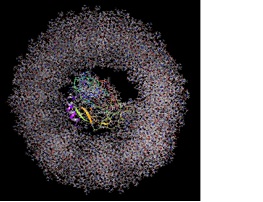
Biography
Biography: Alan J. Russell
Abstract
Biomacromolecular synthesis is the core chemistry of all biological systems. Cellular biopolymers control all complex bioprocesses through regulation of their chemical structure, which allows precise interactions with other biomolecules. Polymer-Enhanced Biomacromolecular Systems use controlled polymer synthetic techniques to enhance the function of biological molecules, cells, and tissues. The ability to tune and improve biomolecular behavior with designer polymers relies on precise control of the interactions between the biomolecules and the polymers. Our interest is in the rational design of polymers that, through chemical tuning, dramatically enhance or transform the function of the biological molecules with which they interact. Inherent to “rational design” is an ability to link the chemical structure of a particular polymer to its ultimate effect on the biological molecule. We are developing an understanding of structure-function interactions between polymers and biological molecules that will result in new synthetic processes, materials and therapies. Society has come to expect that biology and chemistry should work in unison to provide sustainable smart materials, rugged chemical components and therapies that are targeted and effective. We are focused on solving a variety of defense challenges that require the ruggedization of biology. Controlled polymer synthesis enables the generation of polymer shells around a biomolecule that can rationally tailor function. Because the polymer chemistry is tunable, Polymer-Enhanced Biomacromolecular Systems can take advantage of a large molecular space that convey unique properties to the modified biomolecule, cell or tissue. We have learned how to covalently couple or display multiple small molecule initiators onto a protein surface and then grow polymers from those sites. The technique is so powerful that a single protein-polymer conjugate molecule can exhibit the properties of both the biomolecule and the polymer. We have used stimuli-responsive polymers that respond to external triggers, such as temperature and pH, while maintaining biologic activity. This seminar will outline our progress and the remaining challenges in the design and synthesis of next-generation polymer-enhanced biomacromolecular systems.



